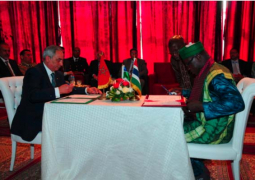The training that targeted over forty butchers was funded by the Livestock and Horticulture Development Project (LHDP) with funding from IFAD, which contracted the GLMA to carry out the training.
Speaking at the opening ceremony, Ebrima Cham, director of technical and field services at the GLMA, said the training was very important for the attainment of food security, particularly to those who consume pig.
He added that the training was held to enhance the capacity of forty targeted pig butchers and farmers in meat hygiene, handling and processing, to ameliorate some of the identified challenges encountered by pork producers in the LHDP project areas.
“The importance of this training cannot be over-emphasised in the sense that it seeks to address meat hygiene and meat technology training needs with a view to enhancing consumers’ acceptance of pork with the ultimate desired returns through improved production and processing by poor producers,” he said.
According to Mr Cham, to create a better understanding of specified lesion found in pork, pictures of such alteration have been transposed from other resource materials into the training.
He added that the technologies presented in the training are based on what is practicable within the limits of the facilities and resources of the local producers.
After going through the training, the participants are expected to be able to adopt and demonstrate best practices in butchery, adopt the principles of meat hygiene and handling, and in addition, share the knowledge and skills acquired from the three-day training with peers, in order to create a multiplier effect, with the ultimate goal of increasing the protein requirement of the people, through the production and consumption of high quality and wholesome pork.
Mr Cham added that the training aimed to inculcate in the butchers the habit of cleanliness and maintaining good sanitary standards when handling meat, to ensure that only healthy and clean butchers handle the slaughtering and processing of meat since good personal hygiene would reduce the risk of disease transmission from the butchers, especially during handling and processing of meat.
The training was prepared in the context of food security by the GLMA, in partnership with individual experts, in response to the butchers’ training-request of the LHDP.
Therefore the need to build the capacity of pork producers in meat hygiene and technology to achieve pork safety and quality assurance cannot be overemphasized, he said, adding that it is common knowledge that health and nutrition of the people increase the availability of the workforce for agricultural production.
For his part, the director general of the GLMA, Dr Demba Jallow, used the opportunity on behalf of the entire management of the GLMA to thank the LHDP and by extension IFAD, for being the first institution to award the Agency a contract for consultancy services, particularly, this one which is of immense importance and relevance to its mandate.
In the same vein, he said, the GLMA management thanked all those who contributed in one way or another to the success of the training.
He also used the opportunity to thank the President of The Gambia for his personal support to the GLMA.



